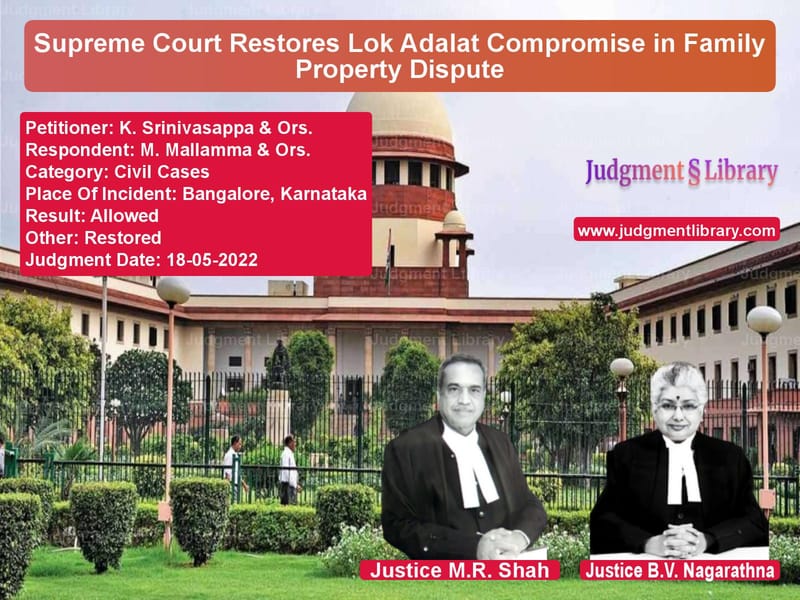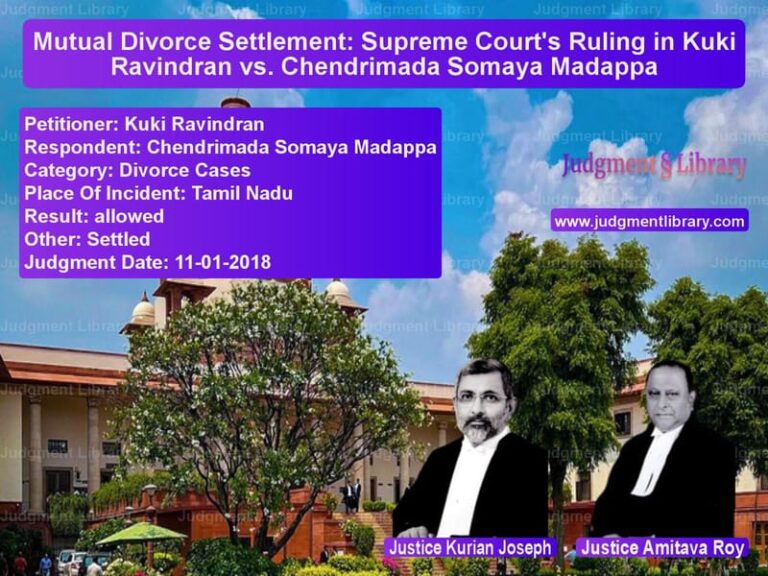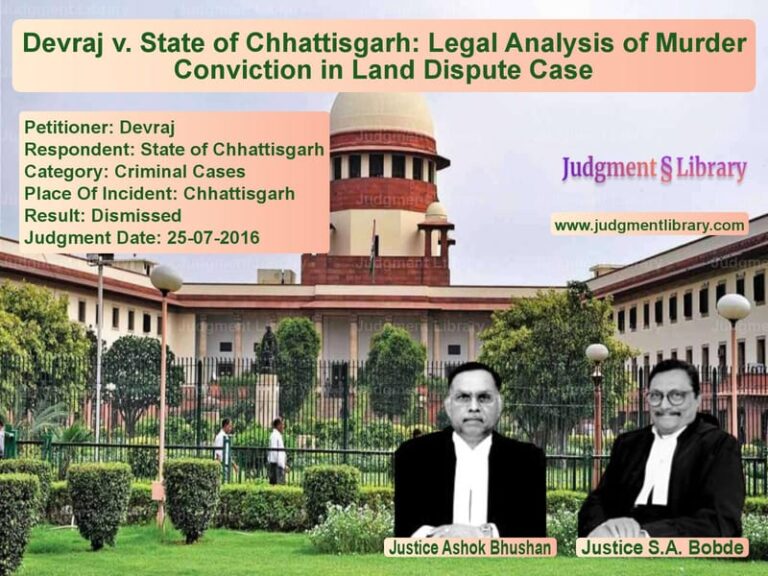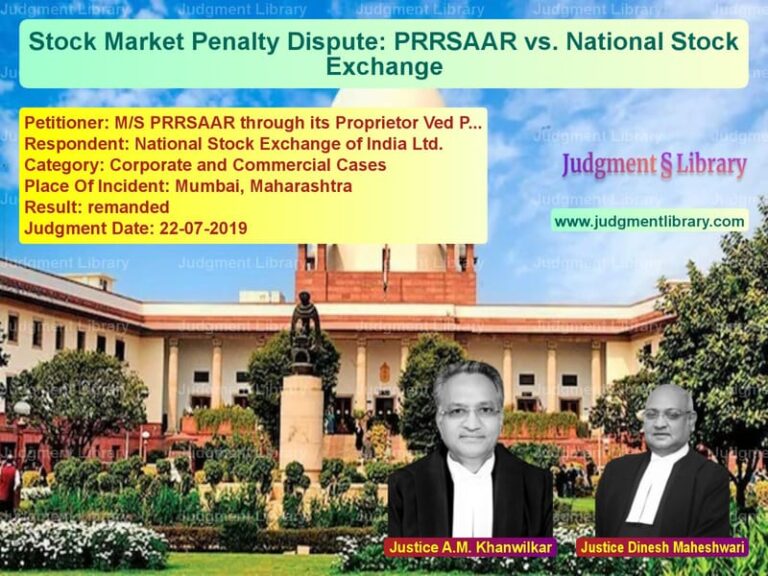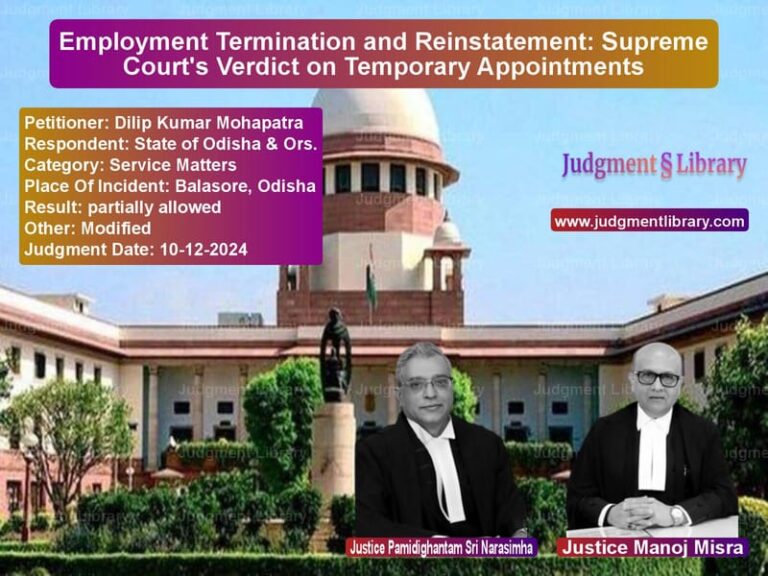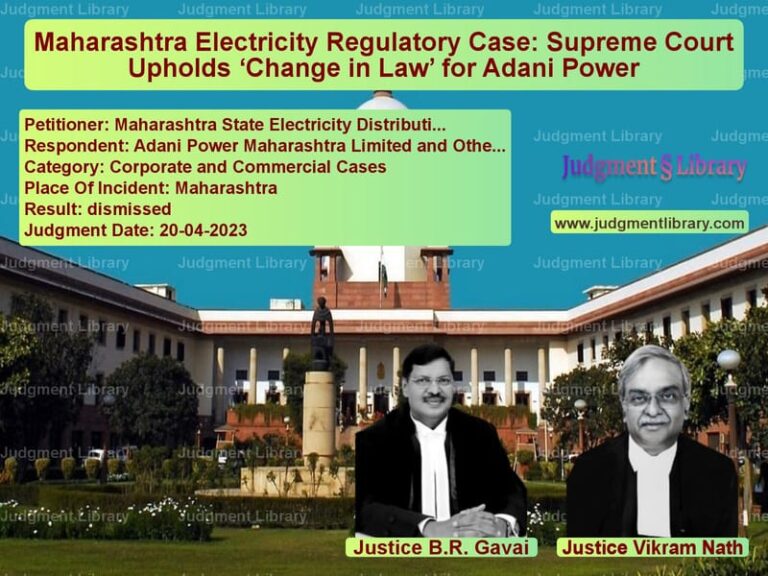Supreme Court Restores Lok Adalat Compromise in Family Property Dispute
The Supreme Court of India recently delivered a significant judgment in the case of K. Srinivasappa & Ors. vs. M. Mallamma & Ors., addressing a family property dispute that had been settled through a Lok Adalat compromise. The ruling clarified the legal sanctity of Lok Adalat decrees, the conditions under which they can be set aside, and the importance of finality in judicial settlements.
The Supreme Court set aside the Karnataka High Court’s decision that had nullified the compromise, restoring the original settlement recorded by the Lok Adalat. This judgment is crucial in reinforcing the principles of legal certainty and preventing undue challenges to compromises reached through alternative dispute resolution mechanisms.
Background of the Case
The dispute arose among family members over the partition of ancestral properties in Bangalore, Karnataka. The plaintiffs had filed a suit for partition and separate possession of their shares in the suit properties. During the proceedings, the parties reached a compromise settlement and presented it before the Trial Court.
On 30th June 2012, a compromise petition was jointly filed by all parties, agreeing on the division of property and financial compensation for those relinquishing their claims. The terms included payments made by the defendants to the plaintiffs in return for the plaintiffs giving up their rights over the disputed properties. This compromise was recorded and approved by the Lok Adalat on 7th July 2012, which passed a decree accordingly.
However, two days later, three plaintiffs—Nos. 4, 5, and 6—challenged the compromise, alleging that their consent was obtained through fraud and misrepresentation. They claimed they were unaware that they were signing a settlement document and believed they were merely signing tax-related documents.
The High Court of Karnataka, in a judgment dated 17th April 2015, set aside the Lok Adalat’s order and restored the partition suit, directing the Trial Court to proceed as if no compromise had been reached. This prompted an appeal to the Supreme Court by the defendants.
Key Legal Issues Before the Supreme Court
- Whether a compromise decree recorded by a Lok Adalat can be set aside on allegations of fraud.
- Whether the High Court was justified in nullifying the settlement without providing detailed reasoning.
- The legal sanctity of Lok Adalat awards and their finality under the Legal Services Authorities Act, 1987.
- The implications of parties accepting financial compensation and later challenging the settlement.
Arguments Presented
Petitioners’ (Defendants’) Arguments
- The plaintiffs had willingly signed the compromise petition in the presence of their lawyers, and the terms were explained to them in Kannada.
- The Lok Adalat’s decision was final and binding under Section 21 of the Legal Services Authorities Act, 1987.
- The plaintiffs had already received and encashed financial compensation as per the compromise and could not subsequently challenge the agreement.
- The High Court failed to provide proper reasoning while setting aside the Lok Adalat order.
Respondents’ (Plaintiffs’) Arguments
- They were misled into signing the settlement document and were unaware of its implications.
- The financial payments received were not part of the compromise but were related to another transaction.
- The High Court rightly set aside the settlement due to fraudulent misrepresentation by the defendants.
Supreme Court’s Observations and Ruling
1. Lok Adalat Decrees Are Final and Binding
The Court reaffirmed that settlements reached before a Lok Adalat are final and cannot be easily overturned. The judgment stated:
“The award of the Lok Adalat shall be deemed to be a decree of a Civil Court and shall be final and binding on all parties.”
2. High Court’s Decision Lacked Proper Justification
The Supreme Court criticized the High Court for setting aside the compromise without giving specific reasons:
“The High Court did not provide a reasoned decision while reversing the Lok Adalat’s decree. Such a serious interference requires detailed justification.”
3. No Evidence of Fraud
The Court found that the plaintiffs had failed to prove any fraud in obtaining their signatures. It noted:
“Allegations of fraud must be substantiated with clear evidence. Mere claims of misunderstanding do not suffice to invalidate a settlement.”
4. Plaintiffs Had Accepted the Settlement Benefits
The Court emphasized that the plaintiffs had accepted and encashed financial compensation as per the settlement:
“Parties who accept benefits under a compromise cannot later challenge it without returning the received compensation.”
5. Lok Adalat’s Authority Must Be Respected
The judgment reinforced the importance of respecting the authority of Lok Adalats and ensuring legal certainty:
“Frequent challenges to Lok Adalat settlements will undermine the entire alternative dispute resolution mechanism.”
Impact of the Judgment
The ruling has significant implications for dispute resolution and legal certainty.
1. Strengthening the Authority of Lok Adalats
The decision reinforces that Lok Adalat decrees are final and should not be overturned without strong justification.
2. Protection Against Unjustified Challenges
The judgment prevents parties from challenging compromises after benefiting from them, ensuring legal stability.
3. Ensuring Fairness in Settlements
While emphasizing finality, the Court also upheld the principle that fraud allegations require clear evidence.
4. Reducing Litigation
The ruling discourages frivolous challenges to out-of-court settlements, promoting efficient dispute resolution.
Conclusion
The Supreme Court’s decision in K. Srinivasappa & Ors. vs. M. Mallamma & Ors. is a landmark ruling on the finality of Lok Adalat settlements. By restoring the compromise and emphasizing the binding nature of Lok Adalat decrees, the judgment upholds legal certainty and alternative dispute resolution. This ruling serves as a critical precedent for similar property and family disputes, ensuring that once a matter is settled, it cannot be reopened without compelling reasons.
Petitioner Name: K. Srinivasappa & Ors..Respondent Name: M. Mallamma & Ors..Judgment By: Justice M.R. Shah, Justice B.V. Nagarathna.Place Of Incident: Bangalore, Karnataka.Judgment Date: 18-05-2022.
Don’t miss out on the full details! Download the complete judgment in PDF format below and gain valuable insights instantly!
Download Judgment: k.-srinivasappa-&-or-vs-m.-mallamma-&-ors.-supreme-court-of-india-judgment-dated-18-05-2022.pdf
Directly Download Judgment: Directly download this Judgment
See all petitions in Property Disputes
See all petitions in Damages and Compensation
See all petitions in Judgment by Mukeshkumar Rasikbhai Shah
See all petitions in Judgment by B.V. Nagarathna
See all petitions in allowed
See all petitions in Restored
See all petitions in supreme court of India judgments May 2022
See all petitions in 2022 judgments
See all posts in Civil Cases Category
See all allowed petitions in Civil Cases Category
See all Dismissed petitions in Civil Cases Category
See all partially allowed petitions in Civil Cases Category

